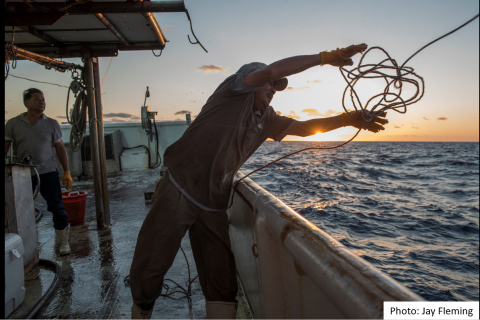A new video from the Oceanic Fish Restoration Project (OFRP) highlights the voices of fishermen from around the Gulf of Mexico, as the six-year project enters its final stage this year.
Gulf fishermen participated in the project by voluntarily refraining from open ocean, or pelagic, fishing and using alternative fishing gear types for part of each year from 2017 to 2022. The final participation phase wrapped up in 2022, and NOAA will complete the final data analysis and share it with the public later this year.
of fishermen who participated in the effort,hailing from across the Gulf of Mexico (Photo: Jay Fleming)
The project had broad participation from across the Gulf of Mexico, with participants hailing from Louisiana, Florida and Texas. In total, 20 unique vessel owners participated, representing about half of the pelagic longline fleet in the Gulf.
Some vessel owners participated for multiple years. Many offered positive feedback about their experience.
“I found it very rewarding to be a part of the project and experiment with the new gear, as well as to be a part of something that could help restore fish in the Gulf,” said one fisherman.
“The six-month repose was very good for participants,” said another participant. “We could not fish after the spill because of the oil. Now, fish are coming back.”
Project Background and Need
The $20 million project was approved as one of the Deepwater Horizon Early Restoration projects, and conducted in close partnership between NOAA and the National Fish and Wildlife Foundation (NFWF).
The need for the project arose from direct and continuing impacts to Gulf pelagic fish species after the spill, including tuna, billfish, and mackerel. In addition to killing fish outright, NOAA studies found that the oil spill caused continuing toxic effects on fish, including cardiac-related deformities. The Deepwater Horizon injury assessment found many negative effects from the oil, including impaired reproduction and reduced growth.
The goal of the project was to reduce fish mortality in order to allow species impacted by the 2010 oil spill to better grow and reproduce. This in turn helps support healthier populations of pelagic fish throughout the Gulf.
Fishermen in the Gulf of Mexico have a long history of participating in restoration and conservation, from utilizing new types of fishing hooks to adhering to fishing area closures. NOAA and NFWF prioritized the expertise and opinions of pelagic longline vessel owners at every stage of the project. Discussions with vessel owners shaped adjustments and enhancements to the project. For example, participants recommended additional alternative gear types to use, and those were added starting in 2018.
Participating vessel owners agreed to refrain from fishing with pelagic longline gear for a six-month “repose” each year. Participants were compensated during the repose, and also had the option to continue fishing using alternative gear types provided to them. NFWF and NOAA provided training and resources to participants to improve their proficiency with the alternative gear. The multiple gear options provided alternative harvest opportunities for fishermen, which helped offset economic impacts of the repose.
The project has helped nearly 35,000 pelagic fish such as yellowfin and bluefin tuna to remain in the Gulf of Mexico. While fishermen caught fewer target species with alternative gear, over half of non-target species caught as bycatch with alternative gear were released alive. Reducing fishing pressure on these stocks, and avoiding bycatch has allowed fish to grow and reproduce that would otherwise have been caught.
Fish Restoration Projects approved by the Open Ocean Trustee Implementation Group
Other Open Ocean fish restoration projects collaborating with Gulf fishermen and anglers include:
- Return ‘Em Right, angler-driven initiative that will tackle release mortality from barotrauma to restore recreational reef fish species.
- A project restoring fish by improving bycatch reduction devices in the Gulf commercial shrimp trawl fishery.
- A project using technology to inform fishermen of high-bycatch areas to reduce unwanted catch, predation, and discards.
Additional Resources
We also send out updates via email. If you haven’t already, please sign up for email updates to receive the latest news from all the Deepwater Horizon Trustees.


